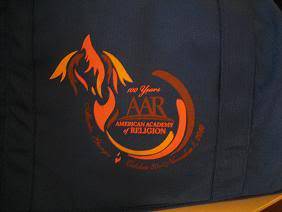Thousands of smiling, mild-mannered people with blue tote bags have descended on the Hyatt Regency in downtown Atlanta. This is the 2010 American Academy of Religion conference. I’m posting from my room in that hotel, using the wireless internet that they made me pay for on top of the room rate. Why do expensive hotels do that? Oh right, because they can.
 |
| My spiffy bag |
Anyway– I’m here because I’m on the steering committee for the cognitive science of religion consultation this year, and hopefully will be next year and as long as they’ll have me after that. Even though the vast majority of panels at AAR aren’t for me, I just love academic conferences and the enthusiasm from all of these people– some wearing suits, some that look like hippies, some wearing Buddhist saffron, some in leather– is palpable. And though the cognitive science section is just getting off the ground, it’s doing so fast. Attendance has been really good in the past two years, which was a hard thing for me to imagine when searching almost in vain for science-related sessions prior to that. In 2007 I was excited to attend a special session in an enormous ballroom dedicated to discussion of the Flying Spaghetti Monster, only to find when I arrived in the heavily populated room that the talks would primarily be about the FSM’s status as a “new religious movement” and virtually nothing about evolution, intelligent design, or church and state issues. Sigh.
This year, on the other hand, is a different ballgame. A few hundred people attended a plenary talk by Frans de Waal, a noted primatologist based at the Yerkes Primate Center here in Atlanta. He has been researching the capacity of chimpanzees and bonobos (and sometimes other animals) to practice empathy for decades, and based his most recent book, The Age of Empathy, specifically on that subject. I haven’t gotten through the whole thing at this point so won’t review it yet, but I can say that it should be an easy and engaging read for a non-specialist. If you’re interesting in hearing about the impressions of ape capacity for reciprocal exchange, altruism, and love from a person who spends virtually every waking hour around them, this book would probably be a good choice for you. Be aware, however, that this is a contentious subject and de Waal definitely has his detractors. For more on who they are and why, you might want to pick up Primates and Philosophers: How Morality Evolved.
| Oooh….TV. Georgia TV |
This morning’s session was on scientific approaches to religion and reductionism, which is going to be a topic that keeps coming up so long as there are people who don’t understand that reductionism is what science does, and that it’s necessary. The third speaker gave what I considered the most interesting talk, making a case for something similar to what psychologist Bruce Hood calls “supersense”– the religious sensibility being something that views ordinary objects and behaviors as special for unseen reasons. A believer who nonetheless devours scientific explanations for religion, he referred to the different kinds of knowing about religion: a) knowledge of the facts about religious beliefs and behaviors, b) introspective knowledge of what it feels like to believe, and c) a scientific understanding of the “how” of religious and behaviors. The “insider/outsider problem” is a well-known one in religious studies, and people will always be asking whether a believer or a disbeliever is in a better position to give an authoritative description of a religion. The answer, of course, is that it’s similar to asking whether something is nature or nurture: it’s both, depending on what you want to know. However empathetic a person you are, empathy relies to an incredible degree on having experienced something like that which your subject is experiencing, or as close to it as you can get. A person who has never believed in God is just not going to understand what it feels like as well as someone who believes or someone who used to believe and has the memories of that to draw on. Our memories aren’t anywhere near infallible– it’s not like we have VCRs in our heads, let alone Tivo— but an edited and interpreted memory still beats no memory at all.
 |
| 20th floor balcony. Taking this gave me vertigo. |
(I’m working on very little sleep right now…probably should’ve mentioned it earlier, but didn’t because lack of sleep made me forget to do so. Apologies if I’m not making much sense.)
So that’s the first day, and it has been all about empathy for me. The bits of political commentary that have eked their way into the Q&A sessions on some of the talks irritate me, but I suppose it’s to be expected at this point– a conference full of herpetologists would probably find a way to work in some snark at some party/candidate or another at this point. Our section still has some sessions to go, but luckily I have a bit more discretion over what to do tomorrow. I think the aquarium might be calling my name, and I can never pass up an aquarium that can speak.